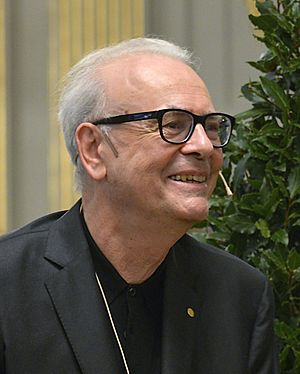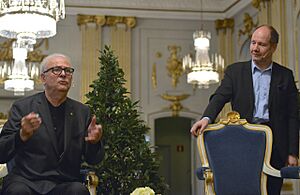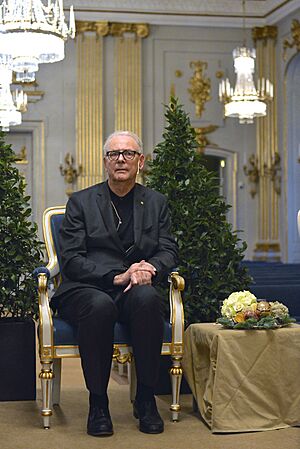Patrick Modiano facts for kids
Quick facts for kids
Patrick Modiano
|
|
|---|---|

Modiano in 2014
|
|
| Born | Jean Patrick Modiano 30 July 1945 Boulogne-Billancourt, France |
| Occupation | Novelist |
| Language | French |
| Genre | Novels |
| Notable awards | Grand Prix du roman de l'Académie française (1972) Prix Goncourt (1978) Prix mondial Cino Del Duca (2010) Austrian State Prize for European Literature (2012) Nobel Prize in Literature (2014) |
| Spouse | Dominique Zehrfuss |
| Children | Zina Modiano Marie Modiano |
Jean Patrick Modiano (born 30 July 1945), known as Patrick Modiano, is a French novelist. He won the 2014 Nobel Prize in Literature. He is known for writing "autofiction," which mixes parts of his own life with made-up stories.
Modiano has written over 40 books. He often explores how people remember things and how their identities are shaped by the past. He is especially interested in the time of World War II in France. Because he often writes about the past, some people compare him to another famous writer, Marcel Proust. Modiano's books have been translated into more than 30 languages. Many of his novels were not translated into English until he won the Nobel Prize.
Before winning the Nobel Prize, Modiano received several other important awards. These include the 2012 Austrian State Prize for European Literature and the 2010 Prix mondial Cino Del Duca. He also won the 1978 Prix Goncourt for his book Rue des boutiques obscures. In 1972, he won the Grand Prix du roman de l'Académie française for Les Boulevards de ceinture.
Contents
Early Life and Family
Jean Patrick Modiano was born on July 30, 1945, in Boulogne-Billancourt, a town near Paris. His father, Albert Modiano, was from a Jewish-Italian family. His mother, Louisa Colpeyn, was an actress from Belgium. Modiano's parents met in Paris during World War II. They lived in secret for a while because of the war. His father had to hide because he was Jewish and did not wear the special badge Jews were forced to wear. He was almost sent away to a camp but was saved by a friend.
Patrick Modiano's childhood was unusual. His maternal grandparents raised him at first, and he learned Flemish as his first language. His father was often absent, and his mother traveled a lot for her acting. This made him very close to his younger brother, Rudy. Sadly, Rudy died from an illness when he was nine years old. Patrick Modiano dedicated his books from 1967 to 1982 to Rudy. In his memoir Un Pedigree (2005), Modiano said he wrote about his family's past and how it affected him.
As a child, Modiano went to different schools. He studied at École du Montcel, Collège Saint-Joseph de Thônes, and then Lycée Henri-IV in Paris. At Henri-IV, he took geometry lessons from the writer Raymond Queneau, who was a friend of his mother. He finished high school in Annecy in 1964. He briefly attended the Sorbonne but did not finish his degree.
Marriage and Daughters
In 1970, Modiano married Dominique Zehrfuss. She once said that their wedding day was a "nightmare" because it rained. Their witnesses were famous writers Raymond Queneau and André Malraux. They had two daughters, Zina (born 1974) and Marie Modiano (born 1978).
Writing Journey
Meeting Raymond Queneau was very important for Modiano. Queneau helped him get into the world of books and introduced him to his future publisher. In 1968, when he was 22, Modiano published his first book, La Place de l'Étoile. This novel was about the wartime period. His father was not happy with the book and tried to buy all the copies. From this first book, Modiano began writing about how the past affects us and how things can disappear.
In 1973, Modiano helped write the movie script for Lacombe, Lucien with director Louis Malle. The film is about a boy who joins a group during the war after being turned away by the French Resistance. The movie caused some discussion because it showed the main character's choices without clear reasons.
Modiano's novels often explore the mystery of identity. He tries to find clues about people's lives by looking at traces from the past. He is very interested in the difficult time of the Occupation during World War II. He returns to this topic in almost all his books. He once said, "In the end, we are all determined by the place and the time in which we were born." He often writes about Paris, describing how its streets and people have changed over time.
Many of Modiano's books deal with memory. In Rue des Boutiques obscures (called Missing Person in English), the main character has lost his memory. He travels far to try and remember his past. The book shows how we are always searching for who we are. In Du plus loin de l'oubli (Out of the Dark), a man remembers a mysterious love story from the 1960s. Years later, he meets the woman again, but she pretends not to know him. Modiano's books often feel like dreams, exploring what is real and what is not.
The theme of memory is very clear in Dora Bruder (also called The Search Warrant). This book mixes different styles, like biography and detective stories. It tells the story of Dora, a 15-year-old girl who ran away from a safe place during the war. She was later sent to a concentration camp. Modiano became interested in Dora's story when he saw her name in a missing persons ad from 1941. He started to investigate, looking for clues in old newspapers and phone books. He wrote about how he could never fully know Dora's secret life. Modiano's quiet novels are sometimes described as sad but exciting stories.
Modiano's 2007 novel Dans le café de la jeunesse perdue is set in Paris in the 1960s. It's about a young woman named Louki, and different people try to understand what happened to her. The book uses several narrators, so readers hear different ideas about Louki. Even with many details about Paris, the story leaves a feeling of mystery.
In his 26th book, L'Horizon (2011), the main character, Jean Bosmans, thinks about his youth and the people he has lost. He remembers Margaret Le Coz, a young woman he met and fell in love with in the 1960s. They wandered the streets of Paris together, trying to escape a hidden danger. One day, Margaret left without a word. Forty years later, Jean decides to look for her. This novel shows Modiano's usual style and interests. He has also written books for children.
Nobel Prize in Literature

On October 9, 2014, the Swedish Academy announced that Patrick Modiano had won the 2014 Nobel Prize in Literature. They said he won "for the art of memory with which he has evoked the most ungraspable human destinies and uncovered the life-world of the occupation." Modiano was the 15th French writer to receive this award.
Many people were surprised when Modiano won the Nobel Prize, including Modiano himself. He said he was "touched" by the honor. At the award ceremony in Stockholm on December 10, 2014, Jesper Svenbro of the Swedish Academy praised Modiano's work. He said Modiano uses small details like old phone numbers and addresses to bring the past to life in his books about Paris.
Awards and Honors
- 1968: Prix Roger-Nimier and the Prix Fénéon for La Place de l'Étoile
- 1972: Grand prix du roman de l'Académie française for Les Boulevards de ceinture
- 1976: Prix des libraires for Villa Triste
- 1978: Prix Goncourt for Rue des Boutiques obscures
- 1984: Prix littéraire Prince-Pierre-de-Monaco for his overall work
- 1990: Prix Relay for Voyage de noces
- 2000: Grand prix de littérature Paul-Morand for his overall work
- 2002: Prix Jean-Monnet de littérature européenne du département de Charente for La Petite Bijou
- 2010: Prix mondial Cino Del Duca for his overall work
- 2011: Prix de la BnF and the Prix Marguerite-Duras for his overall work
- 2012: Austrian State Prize for European Literature
- 2014: Nobel Prize in Literature
Books Made into Movies
Some of Patrick Modiano's books have been made into films:
- Une jeunesse (from the novel of the same name), directed by Moshé Mizrahi, 1983
- Le Parfum d'Yvonne (from the novel Villa Triste), directed by Patrice Leconte, 1994
- Te quiero, directed by Manuel Poirier (from the novel Dimanches d'août), 2001
- Charell, directed by Mikhaël Hers, a short film (from the novel De si braves garçons), 2006
See also
 In Spanish: Patrick Modiano para niños
In Spanish: Patrick Modiano para niños
- List of Jewish Nobel laureates
 | May Edward Chinn |
 | Rebecca Cole |
 | Alexa Canady |
 | Dorothy Lavinia Brown |


